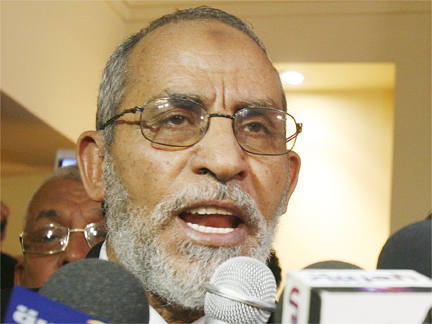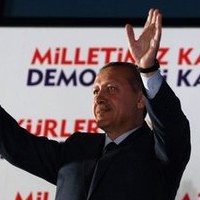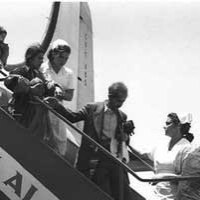![]()
Mon, Feb 14, 2011 | MEMRI | al-Masry al-Youm
Draft Party Platform of the Egyptian Muslim Brotherhood
In the late summer 2007, the Egyptian Muslim Brotherhood released its long-awaited platformsee appendix for its ‘political party’ and distributed the first draft to a group of intellectuals and analysts. The platform was not to serve as a document for an existing political party, but reveals the sort of party the Muslim Brothers would found if they were allowed to do so. Officially, the Muslim Brotherhood is a banned political movement, but after the Egyptian “January 25” Revolution and the resignation of president Hosni Mubarak it’s likely that the Muslim Brotherhood will seek to become a legal political party and participate in free Egyptian parliament elections. But what are the main ideas of the Muslim Brotherhood’s platform and what is the likely course of the Brotherhood’s political role, and the future of its relationship with other political forces in the country? See appendix for the original text of the ‘Platform’ in Arabic.
The Middle East Media Research Institute (MEMRI) published a comprehensive analysis of the Muslim Brother’s Platform in December 2007. We publish the introduction to this study here with a link for you to read the rest of the document at MEMRI’s web site.
Public Debate on the Political Platform of the Planned Muslim Brotherhood Party in Egypt
Introduction
In January 2007, Egyptian Muslim Brotherhood Supreme Guide Muhammad Mahdi ‘Akef declared that, for the first time in its history, the Muslim Brotherhood movement would publicize its political platform. Since then, the official platform has not been released, but a draft of the platform – sent by the movement to some 50 Egyptian intellectuals for review – has been leaked to the media. Several aspects of the leaked draft proposal have evoked intense public criticism.
First, the 180-page draft proposes the reestablishment of the Supreme Council of Clerics, to whose decision the president and the legislative branch must defer on issues of Islamic shari’a. Second, it states that women and non-Muslims are barred from serving as president of Egypt; and third, it stipulates that international agreements signed by past governments – including the 1979 Israel-Egypt Peace Treaty – are to be reexamined and brought to a public referendum.
Most of the platform’s critics in the government and non-government press characterized the draft as promoting the establishment of an Iran-style Islamic state in Egypt. The clause referring to the Supreme Council of Clerics was characterized as an attempt to take legislation out of the hands of the parliament and transfer it to the clerics; the clause excluding women and Copts from the presidency was called discriminatory; and the reexamination of the 1979 peace treaty was seen as a step that would harm Egypt’s prestige in the world and might lead to sanctions against it.
The platform was also criticized by senior Muslim Brotherhood officials, including Political Bureau head Dr. ‘Issam Al-‘Arian and member of the Supreme Guide’s office Dr. ‘Abd Al-Mun’im Abu Al-Futuh, who objected to the clauses dealing with the religious character of the state and the peace treaty with Israel. Muslim Brotherhood leaders outside Egypt, such as Sheikh Rashed Al-Ghanushi, head of the Tunisian Islamist movement Al-Nahdha (“Revival”), and Syrian Muslim Brotherhood Supreme Guide ‘Ali Sadr Al-Din Al-Bayanouni, criticized the clauses referring to the Supreme Council of Clerics and to the status of women and Copts, and demanded that these be revised.
The top Muslim Brotherhood in Egypt leaders, including Supreme Guide Muhammad Mahdi ‘Akef, his first deputy Dr. Muhammad Habib, and Muslim Brotherhood Secretary-General Mahmoud ‘Izzat, promised to review the intellectuals’ feedback before releasing the final version of the platform. However, despite the criticism of the movement from within and from without, they appear to be insisting on retaining the controversial clauses. Responding to the criticism, they stated that the Supreme Council of Clerics was meant to be an advisory body only, aimed at ensuring the implementation of the shari’a as demanded by the Egyptian constitution. They stated further that the clause relating to the presidency was based on an interpretation of the religious sources and would therefore remain as it was, and that international law permitted a referendum on the peace treaty with Israel.
The publication of the official platform has presumably been delayed pending reviewers’ comments, and because of the disagreement within the movement over the phrasing of the platform and over the question of whether and when to announce the establishment of a Muslim Brotherhood party.
The postponement may have also been caused by the wave of arrests of senior Muslim Brotherhood officials, including Mahmoud Al-Ghozlan, who headed the Platform Committee, and the Egyptian authorities’ ban on the movement’s traditional rally at the end of the Ramadan fast, during which many believed the platform was to be officially announced. Muslim Brotherhood Supreme Guide ‘Akef has stated that the final version of the platform will be publicized after all feedback is received and considered.
This report will review the controversial clauses of the platform, the criticism voiced against them by Egyptian columnists and by Muslim Brotherhood members inside and outside Egypt, and the movement’s responses to the criticism.
Read more here.
Appendix
[1] Draft Party Platform (Ikhwanonline — Muslim Brotherhood’s official website), PDF (Arabic).
[2] Muslim Brotherhood’s draft party Platform — Part 1 (Arabic) — (Aug 10, 2007; al-Masry al-Youm, Egyptian newspaper).
[3] Muslim Brotherhood’s draft party Platform — Part 2 (Arabic) — (Aug 11, 2007; al-Masry al-Youm, Egyptian newspaper).
[4] In early November 2010, the Muslim Brotherhood released its official campaign platform for 2010 parliamentary elections in Egypt. Click here for the Brotherhood’s 2010 platform (Arabic).



 RSS
RSS











Draft Party #Platform of the Egyptian #MuslimBrotherhood | #Islamism #Egypt #Jan25 http://j.mp/dYMDlV
RT @CrethiPlethi: Draft Party #Platform of the Egyptian #MuslimBrotherhood | #Islamism #Egypt #Jan25 http://j.mp/dYMDlV
[…] we published this article about the 2007 draft party Platform of the Egyptian Muslim Brotherhood which reveals the sort of […]
[…] there is the party platform of the MB. This was changed in 2007 following a controversy among Brotherhood members and in the […]